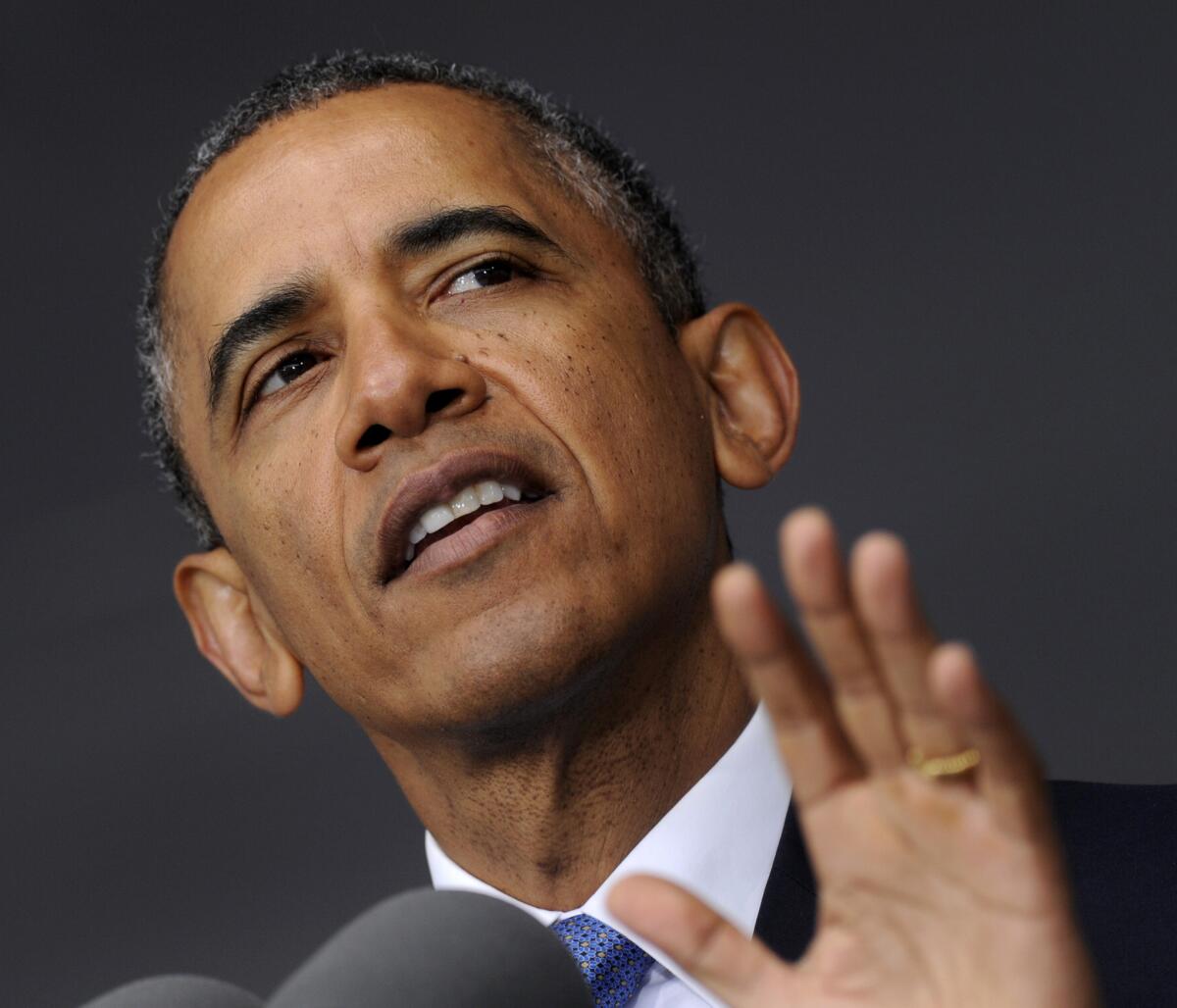Why Obama has changed his mind on Syria

- Share via
President Obama’s foreign policy speech at West Point last week was in large part a list of all the things he doesn’t want to do. He doesn’t want to withdraw from the world. At the same time, he doesn’t want to use military force to solve every problem. Above all, he doesn’t want to get stuck in another war in the Middle East, or anywhere else, for that matter.
But there’s an exception to the Obama Doctrine of restraint: terrorism. Obama is ready and willing to use U.S. military power — indirectly if possible, directly if needed — against terrorists who pose a threat to the United States.
That’s why, even as he has withdrawn troops from Iraq and Afghanistan, the president has sent military advisors to Africa. And that’s why, almost unnoticed, he has approved a gradual but significant escalation of U.S. action on the most complicated and dangerous battlefield of all: Syria.
Only two years ago, when then-Secretary of State Hillary Rodham Clinton and other aides proposed a U.S. effort to arm and train moderates among the rebels fighting the government of Bashar Assad, Obama rejected the idea. The rebels weren’t capable or well organized, he said. A commitment to their fight might draw the U.S. onto a slippery slope of military intervention, he worried.
But now Obama has taken the steps he once refused. Aides say the president has agreed to “ramp up” the modest weapons supplies the U.S. began last year. Perhaps more important, he wants to send U.S. troops to Jordan or other countries near Syria to train rebel units, assuming Congress and the other countries agree.
What’s changed? Not the moderate rebels’ chances of victory in their fight against both Assad and Al Qaeda. After a series of military setbacks, those rebels are in worse shape on the ground than they were two years ago.
Instead, it’s the alarming growth and reach of extremist Islamist groups in Syria — some allied with Al Qaeda — that is driving Obama’s decisions.
Last week, a man from Florida became the first U.S. citizen to die as a suicide bomber in the Syrian war. His death served as confirmation of the trend; as many as 70 Americans, a roughly equal number of Canadians and hundreds of Europeans may have joined jihadist groups in Syria, and, once trained and tested, some might return to attempt terrorism at home.
“What has concentrated our minds is the threat from foreign fighters,” a senior U.S. official told me. “That drives home that we’re talking about real national security interests now.”
And it lands Syria — formerly a humanitarian tragedy and a refugee crisis but not a direct U.S. threat — on Obama’s short list of “core interests” that justify the use of military force.
That doesn’t mean he’s planning direct U.S. strikes against terrorist groups in Syria — at least, not yet. But that option now appears “legally legitimate,” the official said.
For the time being, the U.S. focus is on tipping the balance, if possible, in the civil war; providing an alternative to Al Qaeda for young Syrians who want to fight; and, importantly, providing helpers on the ground for U.S. intelligence agencies as they hunt for potential terrorists. Not on the list of goals: a rebel military victory. That’s way out of reach, officials say.
In an interview with NPR last week, Obama took pains to keep expectations low. “There are going to be limits to how rapidly we can ramp up the capacity of that opposition,” he said. “What we don’t want to do is make promises that we cannot keep.” And maybe the U.S. can shift the balance in favor of a political resolution, he added.
Has any president ever launched a military aid mission with objectives so carefully circumscribed?
What Obama is doing, of course, is trying to stay clear of the dreaded slippery slope toward full military intervention on the rebels’ behalf. Promise too much, officials fear, and sooner or later someone will ask the U.S. to deliver.
The kind of limited commitment Obama is offering Syria’s moderates takes the United States onto swampy moral ground. Once we train and arm “our” rebels, do we have an obligation to defend them against slaughter if they lose?
The United States has been here before. Earlier presidents have sent military aid to one side in a war, only to walk away — with regrets, to be sure — if our allies didn’t win. The fall of Saigon in 1975 was a major defeat for America, but it hardly mattered a decade later. The collapse of Angola’s Jonas Savimbi, a favorite of Ronald Reagan, is virtually forgotten now.
With American aid to the insurgency, Syria’s civil war is likely to continue for many years, and with it the country’s division into sectarian fiefdoms. But that might have happened without American help.
Obama should have heeded Hillary Clinton (and Leon Panetta and David H. Petraeus) and approved military aid to the rebels two years ago, before the number of jihadists had grown so large. But better late than never.
It’s just possible, incongruous though it sounds, that Al Qaeda — by drawing the United States into the fight — might yet save Syria’s democratic opposition from utter defeat.
More to Read
A cure for the common opinion
Get thought-provoking perspectives with our weekly newsletter.
You may occasionally receive promotional content from the Los Angeles Times.










